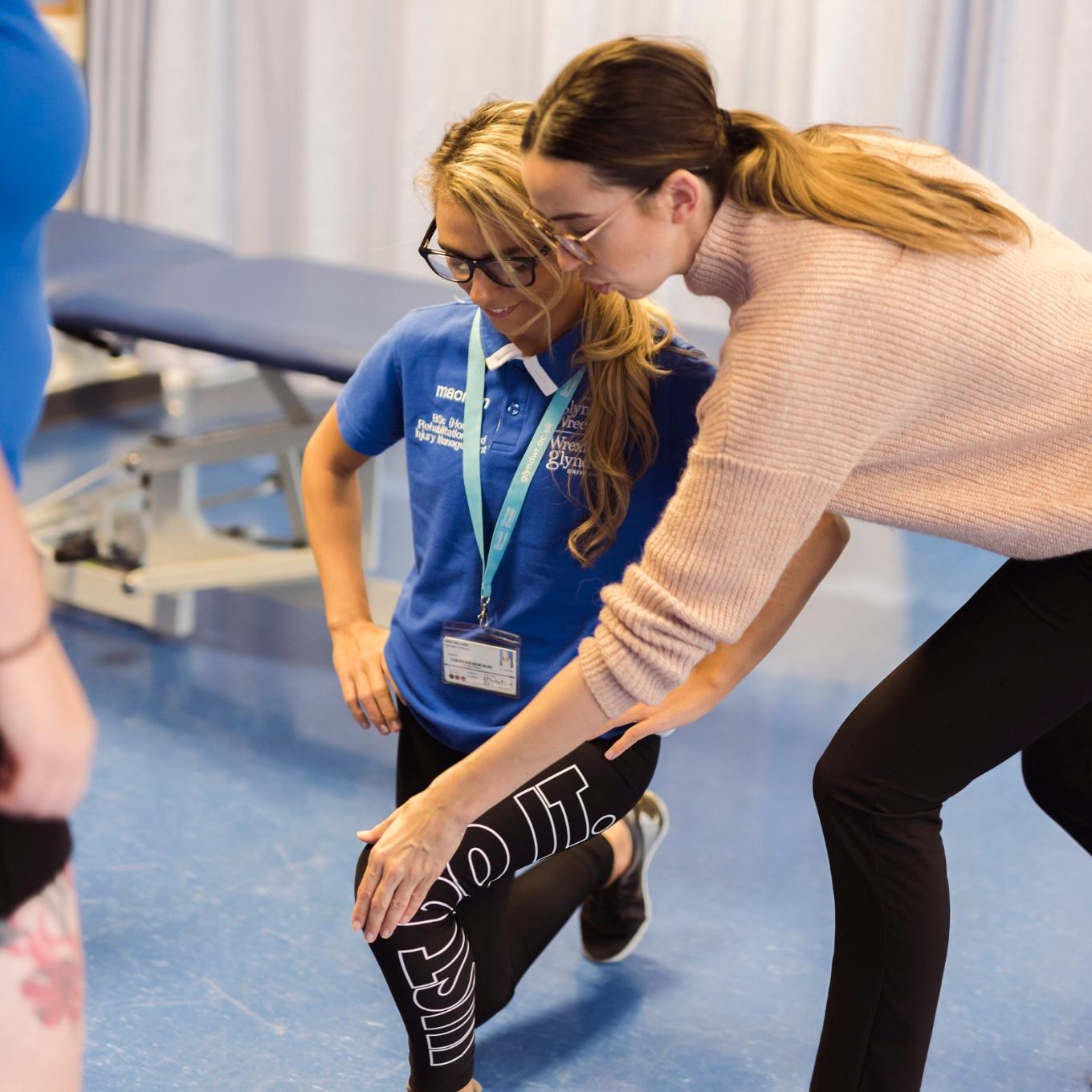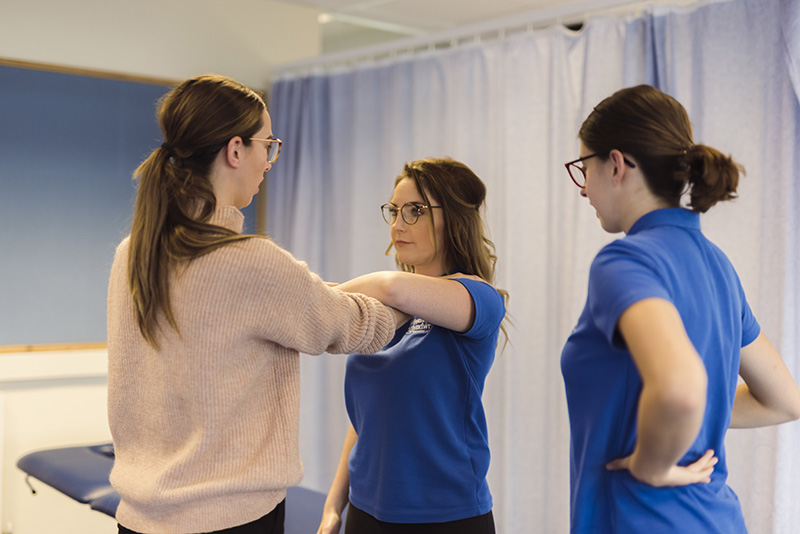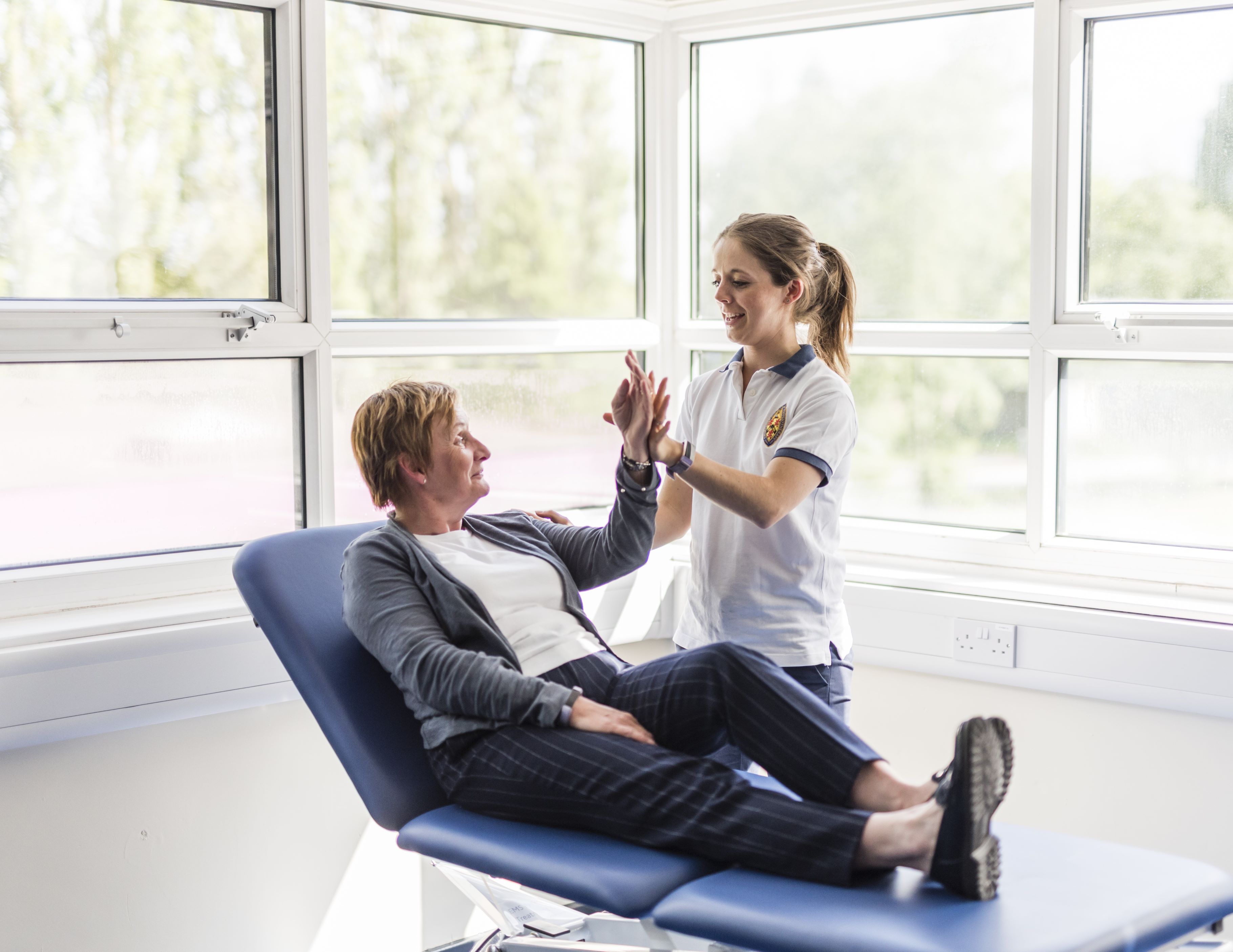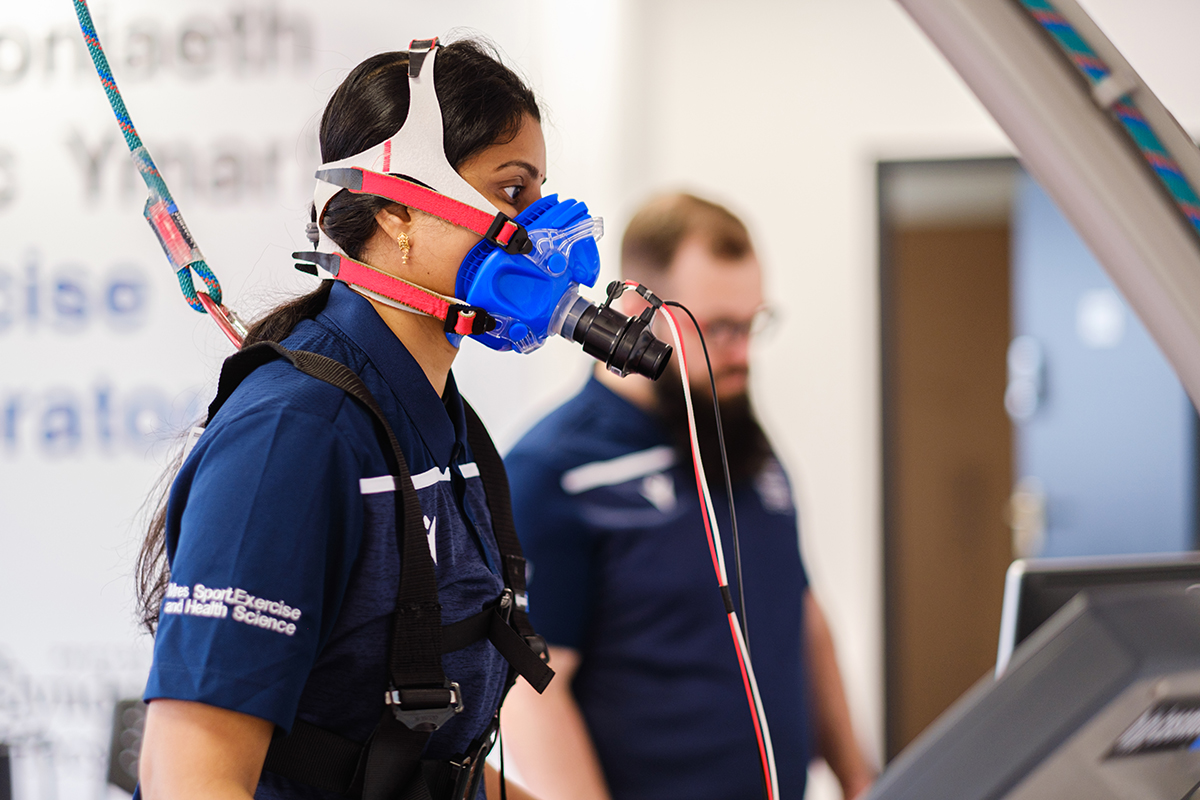BSc (Hons) Sports Injury Rehabilitation

Course details
UCAS Code
12MG
Year of entry
2024, 2025
Duration
3 YRS (FT)
UCAS Tariff
112
Institution Code
G53
Location
Wrexham
Course Highlights
Accredited
by the British Association of Sport Rehabilitators (BASRaT)
Practical
experience in a range of sporting and health-related settings
Elevate
your learning with Widnes Vikings Partnership
Why choose? this course?
This Sports Injury Rehabilitation degree will prepare you for the integrated sports and injury rehabilitation field and more focused environments such as sports teams and health promotion. You'll focus on the wider variables and impact of sports injuries and the importance of having a person-centred approach to care/treatment modalities.
You will:
- Explore the physiological, psychological, cultural and social factors that impact on the health and wellbeing of individuals.
- Consideration of the importance of motivational interviewing/communication.
- Develop skills in workload management and professionalism to optimise client care.
- Be able to practice safely, competently and confidently to ensure they meet the exacting standards of becoming a Graduate Sports Rehabilitator (BASRaT).
- Be adaptable and responsive to the changing climate of sports rehabilitation.
- Consider the wider holistic elements of health and wellbeing and how they affect recovery from injury.
- Demonstrate and apply wider understanding/theoretical principles affecting sports rehabilitation.
- *Study a course that is part of a subject area rated 1st in the UK for teaching satisfaction in the Sports Science subject league tables, The Guardian University Guide 2024.




Sports Injury Rehabilitationat WGU
Interested in Sports Injury Rehabilitation? Hear from lecturers and students to learn more about this degree.
Key course features
- Accredited by the British Association of Sport Rehabilitators (BASRaT)
- Discover the skills required by a practitioner working within the areas of health and fitness on this inspiring course.
- The course places emphasis on gaining practical experience. It draws on existing and exciting partnerships with professional sports personnel, health partner organisations and appropriate professional bodies.
- Study in a British Association of Sports and Exercise Sciences (BASES) accredited laboratory.
- You’ll develop a clinical approach to therapeutic methods to treat musculoskeletal injuries. The course considers injury and rehabilitation; from Injury prevention to rehabilitation.
- Placements feature in each year of study, with a minimum of 50 hours (observational) in year 1, 150 hours in year 2 and 200 hours in year 3.
- *This course is part of a subject area rated 1st in Wales for teaching satisfaction in the Sports Science subject league tables, The Guardian University Guide 2023.
- Our partnership with Rugby League’s Widnes Vikings will provide you with the opportunity to access real-world learning experiences within an elite sporting environment and benefit from a wealth of professional knowledge.
What you will study
YEAR 1 (LEVEL 4)
MODULES
- Sports Injury & MSK Assessment
- Introduction to Anatomy & Physiology
- Introduction to Research Skills
- Sports Massage
- Common Neuromusculoskeletal Injuries and Conditions
- Professional Practise and Communications
Level 4 has a minimum of 50 hours (observational) practice allocated.
YEAR 2 (LEVEL 5)
MODULES
- Functional Rehabilitation 1
- Injury Treatment Modalities
- Functional Rehabilitation 2
- Psychology: Enhancing Performance
- Applied Exercise Physiology
- Academic Discovery – Building Strong Research Ideas
Level 5 has a minimum of 110 hours of practice/placement allocated.
YEAR 3 (LEVEL 6)
MODULES
- Advanced Rehabilitation & Management
- Integrated Clinical Practice in Sports
- Clinical Reasoning
- Integrated Sport and Clinical Practice
- Independent Discovery
Level 6 has a minimum of 240 hours of practice/placement allocated.
The information listed in this section is an overview of the academic content of the programme that will take the form of either core or option modules. Modules are designated as core or option in accordance with professional body requirements and internal academic framework review, so may be subject to change.
Entry requirements & applying
The academic requirements for the course are 112 UCAS tariff points at GCE A-level or equivalent. You must have 5 GCSEs including English/Welsh (First Language), Maths and Science at grade C/4 or above.
In addition to the academic entry requirements, all applicants whose first language is not English or Welsh must demonstrate English language proficiency (evidence of good command of written and spoken English to IELTS 6.0 is required).
Evidence of recent relevant academic study if above has been gained more than 5 years prior to applicant commencement. Demonstration of insight into the Sports Rehabilitator role in a variety of settings.
Occupational Health Clearance
All applicants successful in being offered a place on the programme will be subject to satisfactory occupational health clearance due to the nature of clinical work and potential placements in an NHS/another healthcare setting. This also includes a requirement for relevant immunisations prior to securing a place. This is carried out between an occupational health provider through a service level agreement between the university and provider.
It may be beneficial and is recommended that students hold a full UK driving licence and use of a car as this will maximise practice placement opportunities throughout the duration of the course.
Before you are offered an unconditional place on this degree you will be required to complete a Disclosure and Barring Service (DBS) clearance (previously known as CRB), so that a check can be made on your suitability for working with children and vulnerable adults.
Teaching & Assessment
The assessment types encompass the skills required for a Sports Injury Rehabilitation graduate include:
- Written assignments
- Practical examination
- Critical reflection
- Presentations
- Laboratory reports
- OSCE (an observed structured clinical examination)
- Clinical Placements
Teaching and learning
Wrexham University is committed to supporting our students to maximise their academic potential.
We offer workshops and support sessions in areas such as academic writing, effective note-making and preparing for assignments. Students can book appointments with academic skills tutors dedicated to helping deal with the practicalities of university work. Our student support section has more information on the help available.
In terms of particular needs, the University’s Inclusion Services can provide appropriate guidance and support should any students require reasonable adjustments to be made because of a recognised prevailing disability, medical condition, or specific learning difference.
Career prospects
Our Careers & Employability Service is there to help you make decisions and plan the next steps towards a bright future. From finding work or further study to working out your interests, skills and aspirations, they can provide you with the expert information, advice and guidance you need.
Following completion of this course, graduates may go on to pursue a career in the following areas:
- Professional Sports Clubs
- Self-employment in the private sector
- Partnership in a clinic or practice that offers Physiotherapy, Sports Rehab/Sport Therapy services
- Working as a healthcare or wellbeing practitioner
- Exercise rehabilitation roles in the Armed Forces
- Teaching
- Studying a PhD or Master’s degree
Fees & funding
You do not have to pay your tuition fees upfront.
The fees you pay and the support available will depend on a number of different factors. Full information can be found on our fees & finance pages. You will also find information about what your fees include in the fee FAQs.
All fees are subject to any changes in government policy, view our undergraduate fees.
Accommodation
If you’re looking for a place to stay while you study then take a look at our accommodation pages to get more information on your options, including our on-campus halls of residence Wrexham Village.

